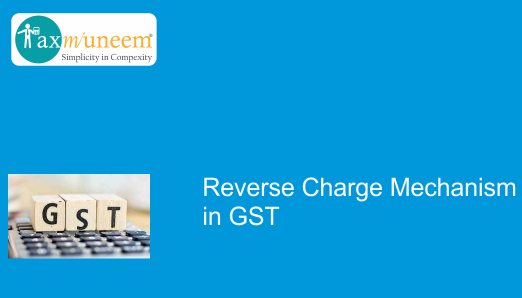Reverse Charge Mechanism in GST
Legal provisions and general guidelines relating to Reverse Charge Mechanism under GST,
Reverse Charge Mechanism (RCM) is not a new concept for service tax assesses, whereas for traders it is fairly a new concept especially for small scale dealers. The concept of Reverse Charge which as introduced originally in the GST Law had a very large scope all inward supplies of goods and services from unregistered suppliers. However, considering the hardship in compliances, lawmakers have relaxed the provisions and now only certain specified goods and services shall be subject to GST under Reverse Charge Mechanism (RCM)
What is Reverse Charge Mechanism in GST
Under Reverse Charge mechanism (RCM), liability to pay GST is shifted on the recipient and he shall be liable to pay GST at applicable rates on all such goods and services received by him.
When is Reverse Charge (RCM) Applicable
A Taxpayer is liable to pay GST under Reverse Charge Mechanism in following cases
1. Receipt of goods or services from unregistered dealer by a Registered dealer
Every taxable person shall be liable to pay GST under Reverse Charge mechanism (RCM) on specified categories of goods and services received from unregistered dealers.
2. Receipt of certain goods or services as specified by the CBIC
Every person shall be liable to pay GST under reverse charge mechanism on the inward supply of specify goods and services irrespective of the status of the supplier i.e. in these cases, a recipient of goods or services shall be liable to pay GST under RCM even if the supplier is registered.
3. Supply of service through an E-commerce operator
A E-commerce operator shall be liable to pay GST under RCM on the services supplied through its ecommerce portal.
4. Import of Goods and services from outside India
Where a person imports any goods or service from outside India, then it shall be liable to pay GST under Reverse charge on such goods or services. In case of goods, the GST is collected by the Custom officials before releasing goods in India, whereas in case of services, the GST is paid separately to the department
Further in case of import of services, the taxability of the same is determined in accordance with the provisions of place of supply and if the place of supply of service is within India, then such services are taxable in India under RCM, whereas if the place of supply of such service is outside India, then it shall not be subject to GST.
Time of Supply in case of RCM
The GST Law provides for time of supply in case of goods or services under Reverse Charge Mechanism. Time of supply refers to the date on which the liability to pay GST under RCM arises.
| Particulars | Goods | Services |
| Time of Supply
(Earliest of any of the event) |
1. Date of Receipt of Goods
2. Date of Payment as per books of recipient or Date of debit of payment from recipient bank account 3. the date immediately after 30 days i.e. 31st day from the date of Issue of Invoice by the supplier 4. Where it is not possible to identify above events, then the date of entry of transaction in the books of accounts of recipient |
1. Date of Payment as per books of recipient or Date of debit of payment from recipient bank account
2. the date immediately after 60 days i.e. 61st day from the date of Issue of invoice by the supplier 3. Where it is not possible to identify above events, then the date of entry of transaction in the books of accounts of recipient |
| For Instance | Date of Receipt of Goods – 10th February 2019
Date of Payment – 19th April 2019 Date of Invoice – 08th February 2019 Time of Supply – 10th February 2019 (Liability to pay GST in the month of February 2019) |
Date of Payment – 19th April 2019
Date of Invoice – 08th December 2018 Time of Supply – 07th March 2019 (Liability to pay GST in the month of February 2019) |
Input Tax Credit (ITC) in case of RCM
A taxable person shall be entitled to avail Input Tax Credit if the said goods and services used in outward supply of goods and services. However, no Input Tax Credit shall be available if the GST paid on inward supply falls under the Blocked Credit.
Some Important Points.
1. GST Registration: Person who is liable to pay tax under RCM is mandatorily required to take registration under GST and it shall not be eligible to claim the benefit of Minimum threshold exemption limit of Rs. 40 lakhs (earlier 20 lakhs).
2. Invoicing Rules: Every taxable person who is liable to tax under RCM on inward supplies from unregistered supplier, shall issue a self-invoice in respect of supplies received from unregistered persons and payment voucher at the time of making payment against such supplies.
3. Place of Supply: Place of Supply of every inward supply of goods and services on which Reverse Charge Mechanism is applicable shall be determined in accordance with Section 10, 11, 12 and 13 of IGST Act.
4. Rate of Tax: Every taxable person shall be liable to pay GST under RCM on inward supply of goods or service at the rate specified in the GST Act for such goods or services.
5. GST under Reverse Charge Mechanism is payable in cash.
GST under Reverse charge mechanism cannot be paid by utilizing input tax credit and the same must be paid in cash to the Government.
Related Articles GST Annual Return, GST Rates for Real Estate
In case of any query or help feel free to contact and you can avail GST Annual return Filing service.
We also provide various services like Private Limited company Registration, Limited Liability Partnership Registration, GST Registration, Accounting Services, Secretarial Compliance, Trademark Registration etc.



